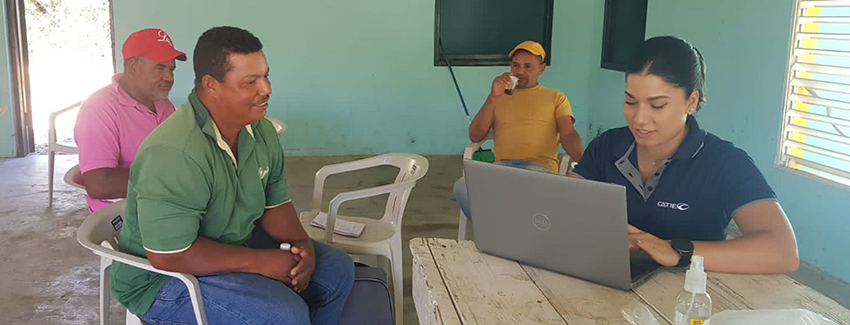Unit for Environmental Economics and Sustainable Agribusiness (UEAAS/EfD)

At UEAAS/EfD we are a multidisciplinary team that uses environmental economics and the promotion of sustainable agribusiness management as a means to promote the achievement of sustainable development goals in the Latin American and Caribbean region.
We generate scientific evidence for the design, implementation and evaluation of public policies, we transfer knowledge and strengthen capacities to various actors interested in using the economic perspective to solve the most urgent environmental problems in the region. Similarly, we contribute to the insertion and staggering of micro, small and medium-sized enterprises (MSMEs) in sustainable agricultural, forestry, aquaculture, fishing and beekeeping value chains.
We focus on four strategic themes:
Financing, conservation policies, and economic valuation
We contribute to the design, implementation, and evaluation of environmental and agricultural public policies based on the use of economic incentives (e.g., taxes, subsidies, Payment for Environmental Services, and Water Funds) and the economic valuation of nature-based solutions. Additionally, we address ecosystem-based adaptation (EbA) from commercial financing and insurance perspectives.
Sustainable agribusiness
We work on strengthening the business environment, particularly in rural areas, by managing sustainable value chains and enhancing competitiveness for micro, small, and medium-sized enterprises (MSMEs) through sustainable agribusiness models. Furthermore, we enhance capacities, foster entrepreneurship, facilitate commercial partnerships, and enable access to high-value socio-environmental markets through product development.

Circular economy
We focus on addressing sustainable production and consumption, including food waste, as well as solid waste management and fiscal and economic options for waste reduction, recycling, and reuse. In the agricultural context, we tackle the issue of taxes or subsidies to encourage lower input usage and contribute to pollution reduction.
Water economy
We analyze community water management for human consumption and irrigation, improving access to water and scarcity management, tariffs, and the sustainability of water service providers, along with aspects related to climate change adaptation in the water sector. We also examine the economic costs and benefits of investments in natural capital or green infrastructure for water management in the context of climate change adaptation.
Environmental economics for growth and environmental conservation in Latin America and the Caribbean
The experience of more than 15 years in the design and implementation of different financial mechanisms has allowed us to contribute to the development of local, national and transnational initiatives that favor the conservation of the environment, improve the living conditions of the population and promote or facilitate the establishment of socially and environmentally responsible business models.
There are recent examples of our work in applied research, consulting and capacity building processes in the region, which demonstrate the positive impact of our actions. In Kingston, Jamaica, a Payments for Water Environmental Services program was designed in conjunction with various government entities and with the support of the Inter-American Development Bank (IDB). Currently, scientific research is also being carried out, together with the National Institute of Forest Science (NiFOS) of the Republic of Korea, to determine the key aspects that can favor the successful implementation of financial mechanisms for the conservation and restoration of the forestry sector in developing countries. National Institute of Forest Science National Institute of Forest Science (NiFOS) of the Republic of Korea, to determine the key aspects that can favor the successful implementation of financial mechanisms for the conservation and restoration of the forestry sector in developing countries.
In addition, with the Inter-American Development Bank (IDB), we support the design of a Trinational Water Fund in the Lempa River Basin, which would benefit comprehensive water management in Guatemala, El Salvador, and Honduras. This work highlights that collective action between countries is essential to mobilize resources for the conservation of transboundary watersheds.
In line with the assessment of ecosystem services and support for climate change adaptation and mitigation processes, we work with National System of Conservation Areas (SINAC), National System of Conservation Areas (ACRXS) and IUCN (International Union for Conservation of Nature) in the diagnosis and identification of opportunities for the implementation of Blue-Green Infrastructures (IAV) in the coastal areas of Costa Rica. As a result of the characterization of HTI options, the modeling of ecosystem services that they provide to society (such as reduction of coastal vulnerability, erosion, and flooding), the cost-effectiveness analysis, and the identification of priority areas for implementation, the government of Costa Rica will have a practical guide for the implementation of these natural infrastructures and the mitigation of the effects of climate change.
Global Scope
At the international level we are part of the initiative Environment for Development (EfD), which is a global network of 13 environmental economics research centers, coordinated from the University of Gothenburg. Through EfD Central America we work together with academics from universities in the United States, Europe, South America, Africa and Asia, discovering information and advising ministries and local governments on economic and environmental decision-making.
Similarly, we have strategic allies, including SIDA, IDRC, IDB, CABEI, UNDP and the United States Embassy, among others.
Multidisciplinary team
At UEAAS/EfD we have a multidisciplinary team that contributes to the management of natural resources from environmental economics and agribusiness management. In EfD's website you can meet our team..
